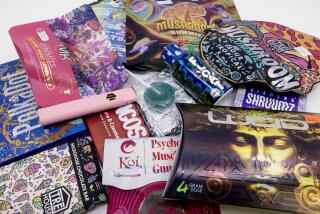Ex-Soviets’ Newest Fear: Mushrooms
- Share via
MOSCOW — Suddenly toxic, possibly mutant mushrooms have poisoned hundreds of people in Russia and Ukraine this summer, baffling scientists and casting a deadly shadow over the traditional warm-weather pastime of mushroom gathering.
With the death toll topping 60, television news broadcast an unprecedented warning Saturday night across the Commonwealth of Independent States, telling people to avoid all mushrooms until the mystery is solved.
An unidentified toxin has apparently infected at least half a dozen types of normally edible mushrooms, turning safe-looking fungi into deadly toadstools.
At least 193 cases of mushroom poisoning--including 23 deaths--have been reported since the end of July in the vicinity of a nuclear power plant in the Voronezh region of Russia, about 350 miles south of Moscow, Russia’s Itar-Tass news agency reported.
Deadly mushrooms have also been blamed for 400 illnesses and 40 deaths in Ukraine.
In most cases, the toxin attacked the victims’ liver and kidneys, causing the organs to degenerate rapidly and in extreme instances leading to death within three days, according to Itar-Tass.
How mushrooms long considered edible have suddenly acquired deadly characteristics remains an enigma. Whether the proximity of a nuclear plant to the site of some reported poisonings has some significance or is merely a coincidence also remains a mystery.
Hunting for environmental causes, scientists have begun checking the Voronezh plant for radioactive emissions and testing local soil for abnormal concentrations of pesticides or heavy metals.
Mushroom specialists are also investigating whether poisonous fungi could have somehow mutated to resemble their edible cousins.
Despite repeated caveats in the Russian media, which culminated in Saturday night’s televised warning, many people have apparently continued to gather, consume and sell mushrooms, which grow in at least 400 edible varieties around Moscow alone.
Foraging for seasonal mushrooms in forests and on the grounds of centuries-old estates is a cherished rite for Russians, who rise at dawn to stalk the fungi of their choice.
Poking at the moist ground with long sticks, they unearth dozens of different types of mushrooms, which they may eat fresh or dried, pickled, fried, marinated or baked in a sour-cream sauce.
Serious mushroom gatherers work from early April through the first snowfalls in November and sell their harvest at farmers markets for high prices.
“All this talk about poisonous mushrooms is pure foolishness,” Andrei Feoktistov, 46, who can earn half the average Russian’s monthly salary in a single busy day selling mushrooms at Moscow’s Central Market, said before Saturday night’s broadcast warning.
Gently brushing the dirt off a hefty white mushroom the length of his index finger, vendor Ivan Chekalev, 26, agreed.
His sales have dropped slightly since the highly publicized poisonings, but Chekalev scoffs at his customers’ wariness, insisting that he can identify toxic toadstools when he sees them.
“I’ve collected mushrooms since childhood, and I know from experience what’s edible and what’s not,” Chekalev said, bristling defensively.
“I always gather them in the same spot, and the conditions there haven’t changed, so what could be wrong with the mushrooms?”
Even the laboratory technicians who test produce at the Central Market say reports of “killer mushrooms,” as one newspaper headline screamed, must be exaggerated.
Although they inspect every mushroom that goes on sale, they do not test them for hidden toxins and so far have received no complaints, lab assistant Anna Shamova said.
The rash of mushroom poisonings is just the latest in a series of mini-epidemics that have hit Russia this summer.
Scores of botulism and salmonella cases have been reported, and health officials have warned people not to buy canned food, dairy products or baked goods from sidewalk vendors, who customarily lack refrigeration to keep their wares cool and fresh.
As with the mushrooms, however, most hard-pressed Russian consumers seem to shrug off the alarming reports because outdoor markets are often the only places to find scarce groceries such as eggs, butter and cheese.
More to Read
Sign up for Essential California
The most important California stories and recommendations in your inbox every morning.
You may occasionally receive promotional content from the Los Angeles Times.













